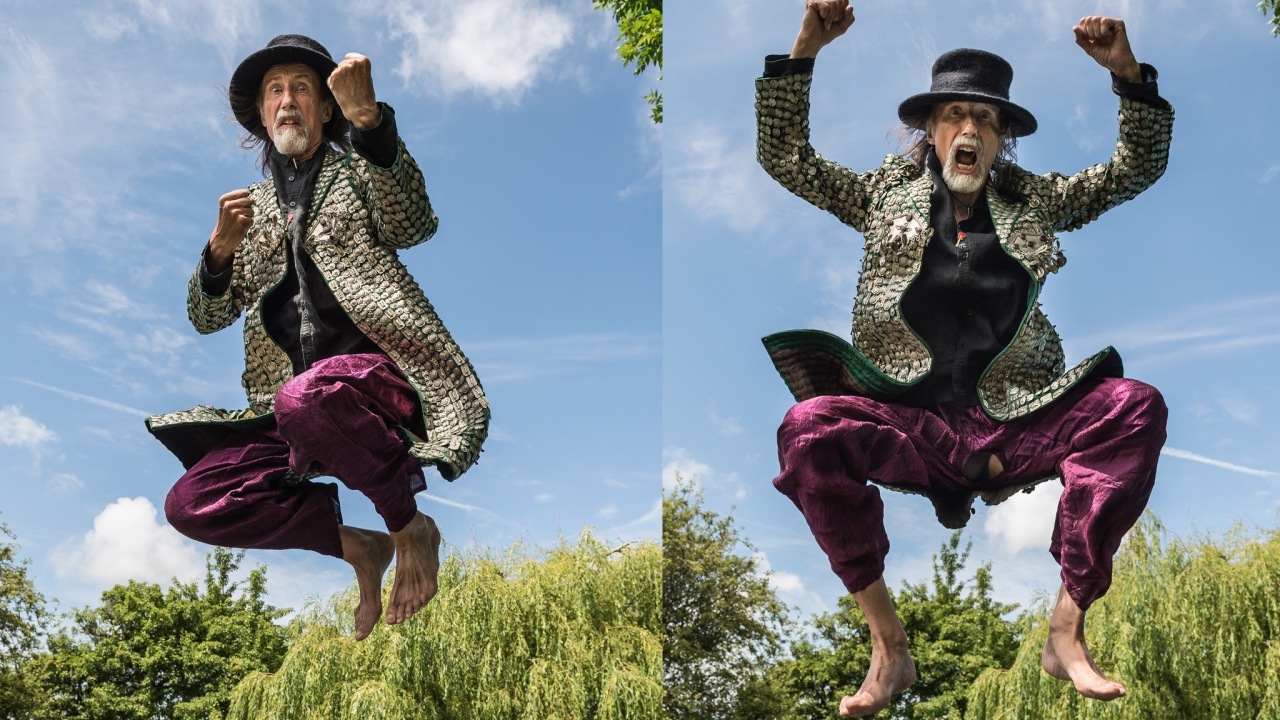Arthur Brown: “Even I don’t know what I’m going to do next..."
In 2014, The God of Hellfire released Zim Zam Zim, and proved Arthur Brown‘s Crazy World was still an unpredictable, exciting and enthralling place to visit!

Arthur Brown has a trampoline. It’s located close to a tree house, and very near to his yurt.
“It actually belongs to my god‑daughter. She’s seven or eight years old, and she and her sister often do somersaults on to it. I don’t do that. But then I am 72 years old.”
However, Brown does regularly use the trampoline. It’s part of his lifestyle, one that sees him happily living in his yurt, situated in a field virtually in the middle of nowhere, albeit only a few miles from Glyndebourne, famous for its annual opera festival. “I haven’t yet been asked to take part in that festival. Maybe they’re worried I might do it naked!” And that’s precisely the sort of thing Arthur Brown might have once done.
“Oh, I wouldn’t do it now. The sight of my body wouldn’t exactly excite anyone! But I have appeared onstage in the nude before. Regularly. I once got arrested in Palermo, Italy, for doing it. I tried to argue that the witnesses for the prosecution who believed I’d been naked didn’t have good eyesight, and I was actually wearing flesh-coloured underpants. The judge told me that he might have believed me – except for all the photos taken which proved I was wearing nothing! But I love Italian justice. The facts don’t matter. Whoever has the better story wins!”
Brown isn’t a man who is too bothered with conventions, which is why he can happily stand in a field dressed in pyjamas, shaving and brushing his teeth, aided by guitarist Nina Gromniak. “She’s been with us [The Crazy World Of Arthur Brown] for three years now. I was looking for a guitarist and someone said they’d seen Nina playing in a reggae band, and she was exactly what I needed. She’d never even played a solo before joining me. But I soon changed all that!”
“The first gig I ever did with Arthur, I broke the neck of my guitar,” reveals Gromniak. “It snapped right off. I should have taken the hint and run!”
Gromniak is featured on the new Crazy World album Zim Zam Zim, which takes Brown back to his origins as an eclectic, unpredictable talent, capable of going in any creative direction. “Jim Mortimore [the band’s musical director] said to me that he wanted to do something similar to the job Rick Rubin did with Johnny Cash. Rick told Cash he didn’t want the smiley, happy man on record, but wanted him to go back to being moody and surly. Jim told me that I should go back to my roots. So, to encourage me, he asked me to text him every morning when I woke up with exactly what was on my mind at the time. Well, he ended up with loads and loads of texts of my streams of consciousness. He took those and made some sort of sense of them, then he and I worked on the lyrics.”
Sign up below to get the latest from Prog, plus exclusive special offers, direct to your inbox!
As you might expect with an individual thinker like Brown, the new album has more than enough twists and turns to confuse and confound. It reflects the way in which Brown views the world. “I know a lot of people think there’s a band of creativity that exists in the air, and that there are some people who have the gift of being able to reach into this universe and act as a conduit, then out comes art. I feel it’s a lot more personal. Everyone has the capacity to become an artist. It’s not because it’s within you, but because it is you. Everything that you are defines your creative instincts. So it’s not an outside force, but an inner one.”
While Brown has an esoteric aptitude that has come from years studying different spiritual practices and experimenting with the consequences of indulging in their ways of life, he’s also very pragmatic. It’s something that has allowed him to be a perennial survivor in a world that has destroyed so many of his contemporaries. And he’s shown this capacity to adapt in the way in which his new album was funded.
“I used PledgeMusic to do it. I was told about how it worked, and gave the artist control, and so I decided to go down this route. And it’s worked really well for me. Of course, I didn’t make the huge amounts that some artists have been able to raise. But I was sensible with the target I set and we comfortably got there. The only irritation is that I’m now committed to all sorts of special events for which people have paid, such as hosting a dinner party. But it’s been worthwhile in terms of giving me the freedom to make the album in my own time frame.”
However, one problem Brown did experience was the concern felt by record labels over the Pledge system. “A lot felt that because people were buying the album in advance, there was no room for extra sales, so they turned the project down. I did think I’d reached an agreement with one company, but having signed the deal, they then pulled out at the last minute, which was extremely annoying, not to say slightly unethical. Thankfully, Bronze Rat came into the picture to save the day.”
Despite his many years as a musician and entertainer, and his reputation as an iconic figure to many, such as Iron Maiden’s Bruce Dickinson, Brown has never been wealthy. “Oh, I get by, and I’m thankful to be able to make a living. But it can cause me a little grief. Right now, I’m having a second yurt built and that’s been going on for a couple of years. The problem is that every time I get the funds together to finish it off, something comes up with the band or the album and I have to spend that money elsewhere. However, that’s a small price to pay for independence. I’m able to live my life the way I want, and there are a lot of very rich musicians who probably don’t have that luxury.”
Brown loves the unusual, whether that means wearing a coat composed solely of different coins, or in playing a uniquely constructed guitar. The latter consists of a broom handle attached to an empty petrol can, which acts as the body, with four raised strings. But he can play it beautifully, as is proven when he perches in the tree house, wearing the coin coat (“That was made ’specially for me”), strumming and humming blues songs, both classics and some tunes and lyrics he makes up on the spot.
“I’m always looking out for different ways to make sounds. I suppose that’s one of the reasons I still love making music. It just fascinates me, and an instrument like this guitar might seem like a gimmick, but it shows how you don’t need to spend a fortune with a big instrument manufacturer to get a great sound.”
His reputation continues to resonate down the generations, as was shown when raga-metal band Skindred asked him to guest on their 2014 album Kill The Power. “I don’t know much about them, but they wanted me to come along and do what they termed ‘an Arthur Brown performance’ as an intro to one of their songs [Ninja]. It seems these people see me as having a particular dramatic timbre to my voice, which nobody else offers.”
It’s this sense of values and talent that has given Arthur Brown such a lengthy career, and that has also made him relevant to every generation. “My father was a very conservative man for almost all his life. But when he was at retirement age, he suddenly decided to become a punk! He dyed his hair and totally embraced the idea of punk. So maybe that’s where I get my feelings for staying young and in touch with what’s happening in the world.”
It isn’t just the present that engages Brown. He’s also thinking about the future, and how humanity might evolve. “I went to a lecture not so long ago, when the idea was put forward that the way the human race is developing, we could end up as far removed from the way we look now as we currently are from the amoeba. It may seem fantastic but it’s certainly logical. So who knows how human beings will look in a thousand years?”
With that thought, Brown starts to hum the beginnings of a new song, one musing about how he’ll evolve over the next millennium, and whether he might have fingers to play the guitar, or even a throat through which to sing. Doubtless this will form the basis for his next album, one as far removed from Zim Zam Zim as this is from anything he’s done before. “Even I don’t know what I’m going to do next. And if I can’t second-guess myself, what chance is there for anyone else?”
Arthur Brown – still crazy after all these worlds.
This article originally appeared in Prog 48.
Malcolm Dome had an illustrious and celebrated career which stretched back to working for Record Mirror magazine in the late 70s and Metal Fury in the early 80s before joining Kerrang! at its launch in 1981. His first book, Encyclopedia Metallica, published in 1981, may have been the inspiration for the name of a certain band formed that same year. Dome is also credited with inventing the term "thrash metal" while writing about the Anthrax song Metal Thrashing Mad in 1984. With the launch of Classic Rock magazine in 1998 he became involved with that title, sister magazine Metal Hammer, and was a contributor to Prog magazine since its inception in 2009. He died in 2021.

